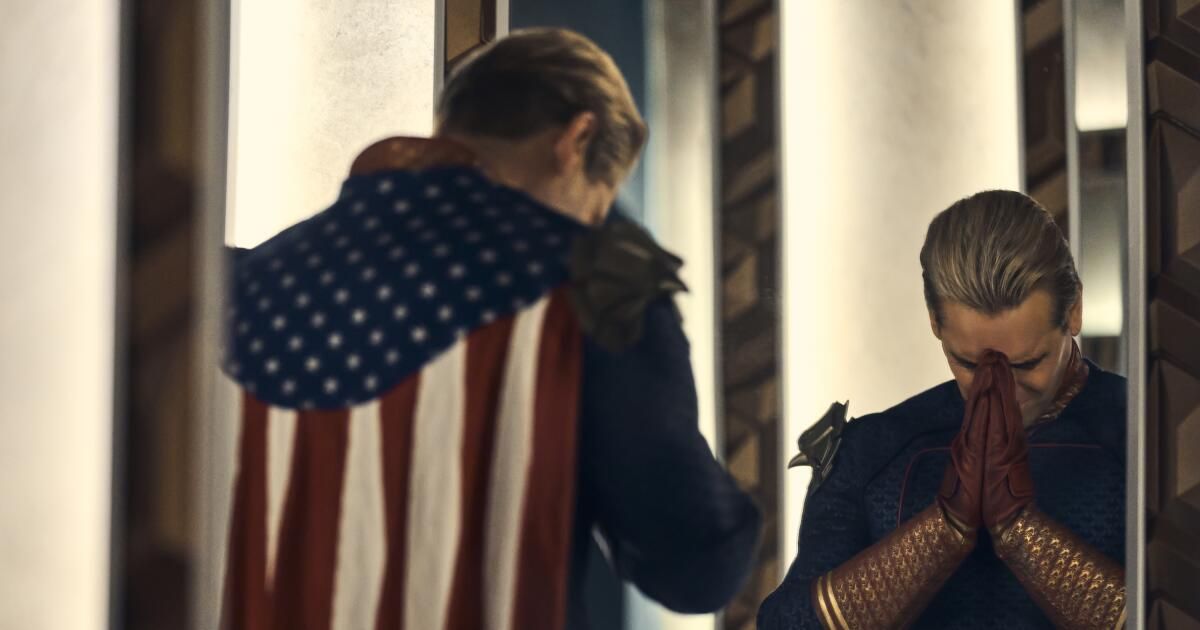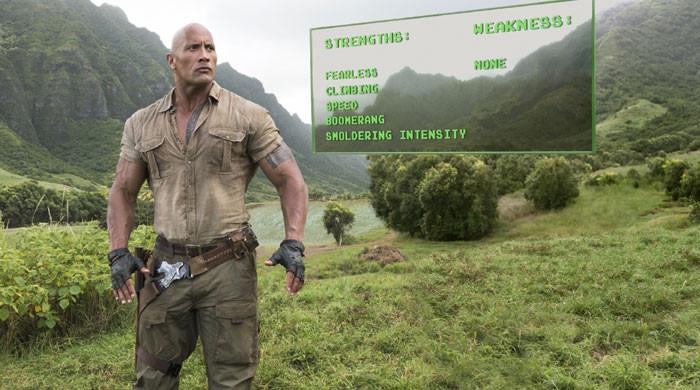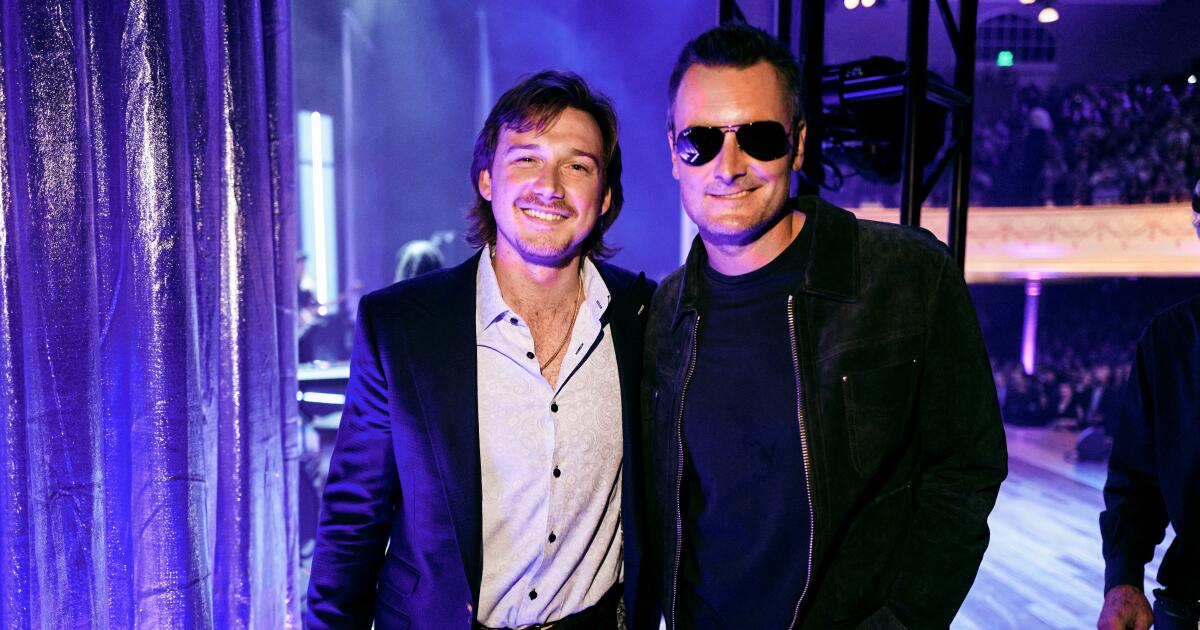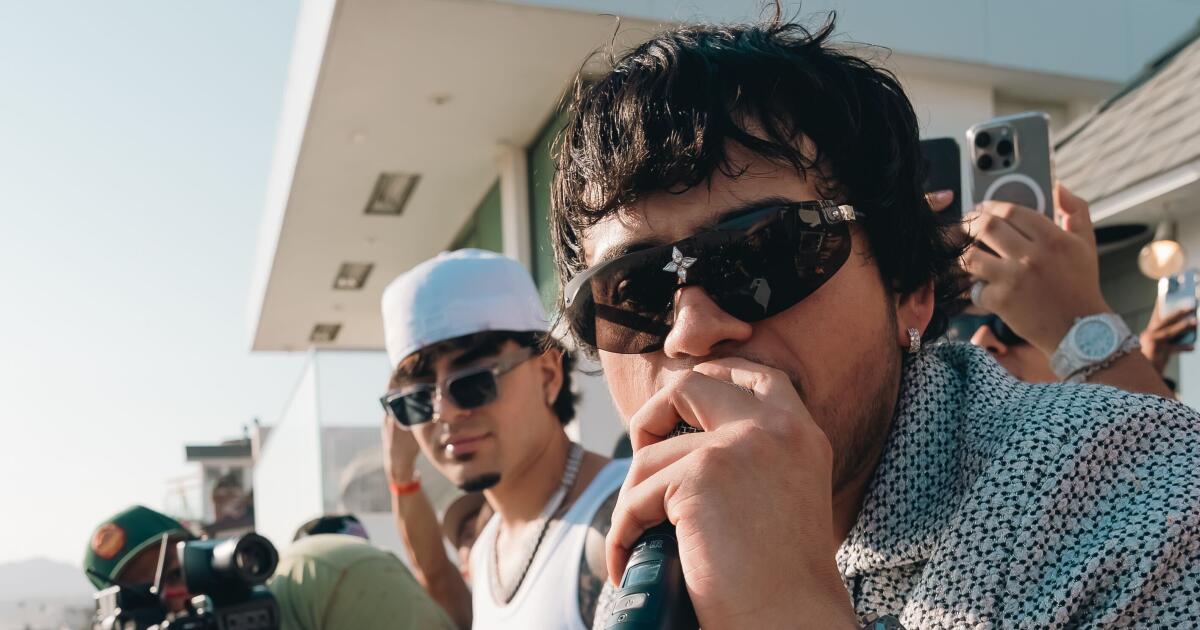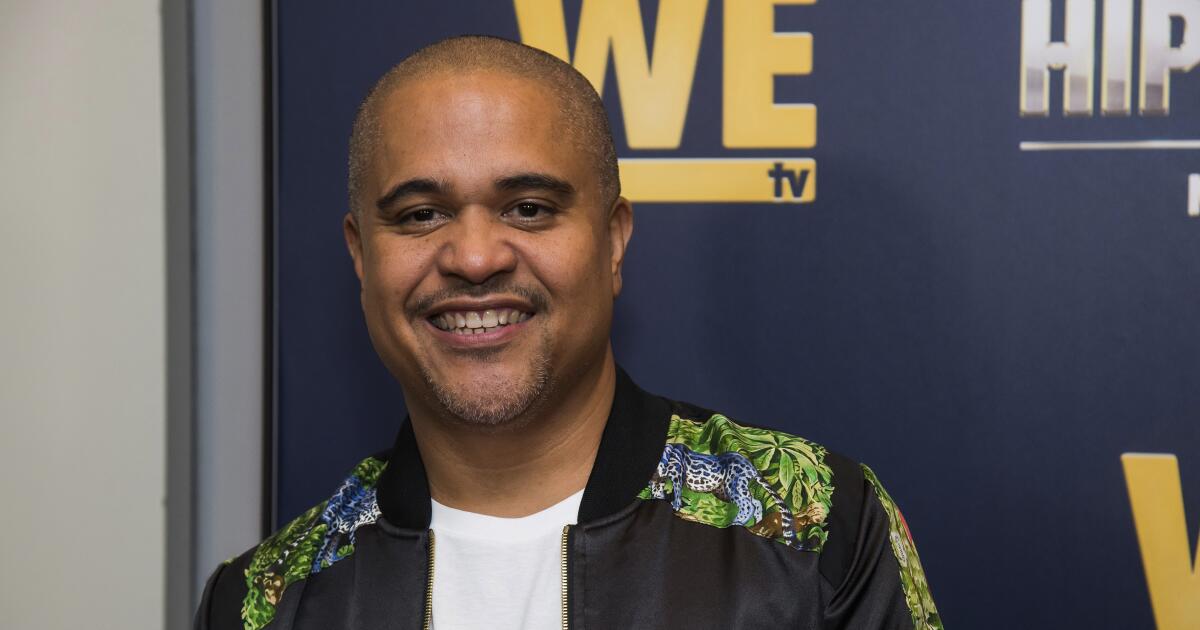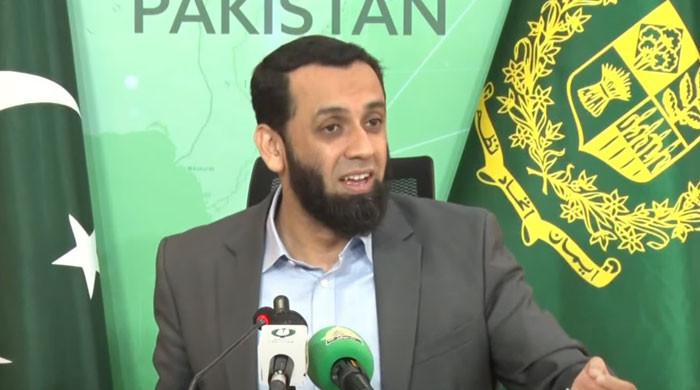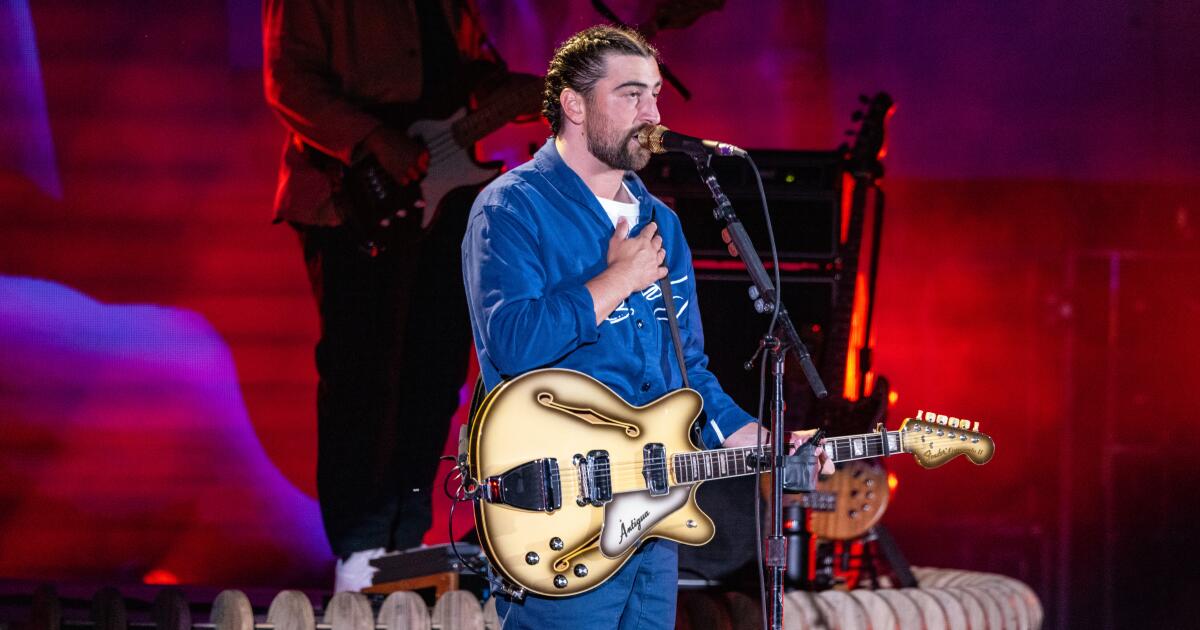This article contains spoilers for the season 4 finale of Prime Video’s “The Boys.”
In this season’s finale of “The Boys,” Homelander, the self-obsessed superhero with an all-consuming lust for power, ends up on top. A figurative president has been elected, putting the superman, played by Antony Starr, essentially in charge of America. One of his friends, a conservative talk show host who goes by the name Firecracker, cries as she says they’re going to “Make America Super Again.”
Days before this episode aired, there was an assassination attempt on former President Trump while he was campaigning in Pennsylvania; the finale now airs on the same day as the final night of the Republican National Convention where Trump, whose slogan is “Make America Great Again,” formally accepts the nomination. That was a complete coincidence (as is the episode title “Assassination Run”). Showrunner Eric Kripke sounded sheepish when he explained on a Zoom call a few weeks ago, with Starr, that the timing of the season finale was not planned.
“What can I say? I’m deeply concerned,” he said. Kripke is not shy about mentioning reference points, adding: “Yes, of course we’re referencing Trump and in particular his malignant narcissism and his egomania, and the fact that unlike last time, he’s now surrounded himself with very smart people who are potentially going to hand the world over to this guy and the odds of that happening are greater than ever.”
The episode, which began airing Thursday, also depicts the assassination of a vice president-elect. Kripke did not respond to a subsequent request for comment. A spokesperson for Sony Pictures Television, which produces the series, said it was filmed last year and a caption was added to the beginning of the episode. It reads: “This episode contains scenes of fictional political violence. Any similarity to recent events is entirely coincidental and unintentional. Prime Video, Amazon MGM Studios, Sony Pictures Television and the producers of The Boys oppose, in the strongest terms, real-world violence of any kind.”
Homelander (Antony Starr) with Ryan (Cameron Crovetti) in a scene from season 4.
(Jan Thijs / Prime Video)
But Kripke said he and Starr were careful not to make Homelander anything more than a blonde, cape-and-Spandex-clad replica of Trump.
“I’m not there to specifically make fun of anyone,” Starr said. “I just want everything to come from something within the character.”
Homelander's rise comes as the Prime Video series prepares to conclude. Kripke announced in June that the fifth season will be the show's last, even as “The Boys” universe continues to expand with the spinoff series “Gen V.” And with Homelander's rise comes the fall of the anti-superhero vigilante group known as The Boys, who are cornered as their time draws to a close.
If all five seasons can be translated into a three-act movie, Kripke said, this is the low point at the end of the second act, leaving room for our heroes to come roaring back in the series' conclusion. Therefore, Kripke needed something “apocalyptic” to happen to the characters.
“I wouldn’t call it a reflex, but I would say it’s our worst fear of a forced version of society,” Kripke said. “I’m not saying it’s actually going to get that bad, but we’re just expressing our anxiety.”
Or maybe some viewers will see it as a good thing?
“Maybe this is a really positive and hopeful note for those who haven't been impressed with the show,” Starr suggested, referring to viewers who expressed disappointment on social media when the show demonstrated its liberal leanings earlier this year.
Not that “The Boys” hasn’t always been pretty explicit about being a representation of what happens when America gives in to fascist tendencies. In Season 2, for example, Homelander teamed up with Stormfront (Aya Cash), a secret Nazi. But this season, and its conclusion, puts the analogy front and center.
“I have to confess that this season I’ve been perhaps a little less subtle,” Kripke said. “But I think that’s just because of the way the storyline aligns with the real world about a presidential election and coups to get to the White House.”
He noted that those stories were taken from the comics, on which the show is based, and were first written by Garth Ennis about two decades ago. “What’s the opposite of kismet?” Kripke asked. “Just a curse?”
Arguably, some of the confusion — if you can call it that — among longtime fans has stemmed from the potency of Starr’s performance as Homelander. Homelander is clearly a bad guy. In the series pilot, for example, he shoots down a plane full of innocent people out of spite. But even though he has superpowers, he’s still human, much to his chagrin. This season, he keeps track of his age by plucking out any gray pubic hair he finds and placing it in a jar. That plot point was a bit of “amazing synchronicity,” Starr said, because he’d been thinking about talking to Kripke about how to incorporate some of his own existential feelings about aging into Homelander. Then he opened the script and found just that.
Starr described the experience of collaborating on Homelander with Kripke as “harmonious parenting.” In conversation, they call the character “Homie” casually. They email each other without saying “thank you” or “affectionately,” but instead using the word “milk,” sometimes in different languages (it’s a reference to the fact that Homelander likes to drink human milk, most often straight from the source, a sign of his immaturity).
“The ideas that come out are fantastic,” said Starr, wearing a Rage Against the Machine T-shirt that has nothing to do with Homelander. “So it’s often a case of just summation: like, what is it that sparks that spark in me? And then I relax again.” [Kripke]“The collaboration,” Starr added, “has benefited the show and the character tremendously by having two people have a great sense of responsibility for the story, the character and the creative process and the integrity of the other.”
Kripke explained that Starr's input was invaluable for the fourth episode of this season, where Homelander returns to the lab where he was raised to torture those who experimented on him. In the script, Homelander was cruel from the start, but Starr suggested a different tactic.
“Ant came up to me and said, ‘That doesn’t seem quite right to me, because he’s coming home and when you come home, you go back to what you were when you were home. You’re that innocent little boy,’” Kripke said, recalling the conversation. “So I think sometimes he was curious and sometimes he was vulnerable, sometimes he was genuinely emotional and then he was cruel.”
Together, they reviewed the material to refine it, and once on set, Starr was free to try out different interpretations of the moments.
“For me, personally, it was about feeling very uncomfortable,” Starr said, pointing to a sequence in which she wanted to laugh from a place of pain.
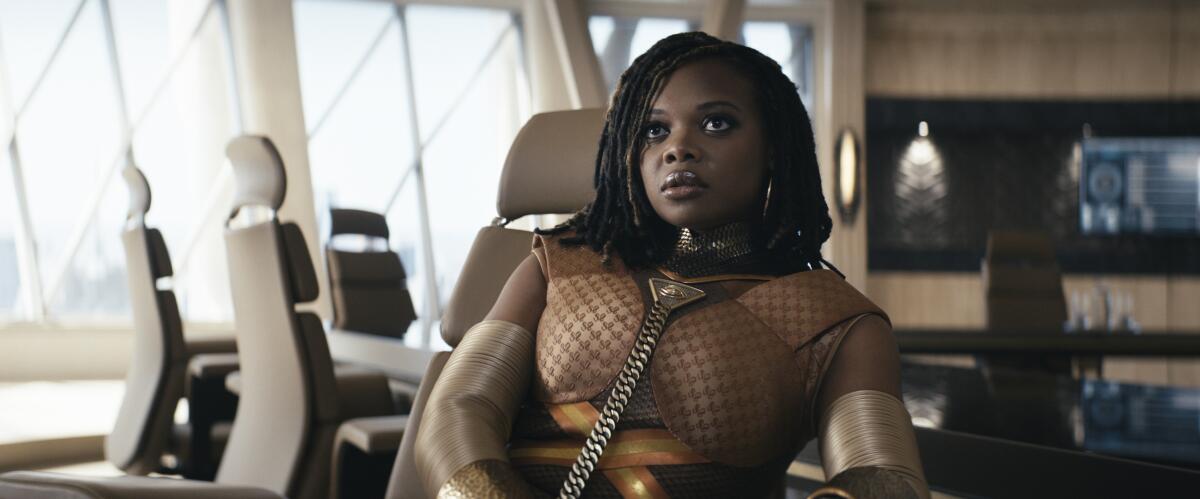
Sister Sage (Susan Heyward), the smartest person on the planet.
(Courtesy of Prime)
Discomfort is perhaps the place where Homelander is happiest, especially in the finale. Just before he takes over, he believes his plan has gone completely awry, leaving him with nothing. Instead, his ally Sister Sage (Susan Heyward), the smartest person on the planet, has budgeted for his failures. Starr said she would have loved to see what would have happened to Homelander if Sage hadn't given him what he wanted.
“It would have been pretty unhealthy,” he said.
Despite his win, Kripke said Homelander is aware that he didn't earn his success.
“Even though he’s literally the king of the world, he’s going to feel inferior because of that,” Kripke said. “Ant and I talked a lot about how Homelander is the weakest character on the show, and this is just another twist on that.”
At the time of our interview, Kripke was finalizing details for season five in the writers room and hadn't yet brought actors into the mix. Still, he knows where everyone ends, and of course, where they begin. With Homelander, he's in a place where he can try to make the world in his image. Kripke, however, did say that he's willing to reveal one plot point regarding Homie: “It won't make him happy. Spoiler alert: He'll still be miserable.”
And what about the parallels with the real world?
“I was hoping that when we got to that final we would all feel like thank God it wasn't going to happen like that, but I'm not that confident anymore,” Kripke said.

